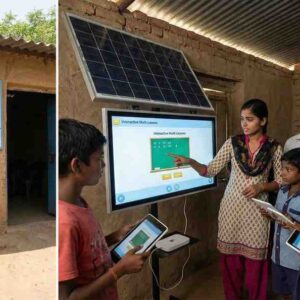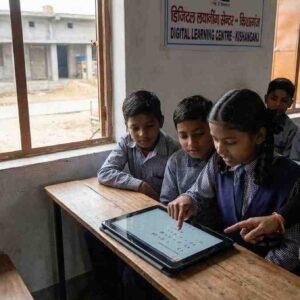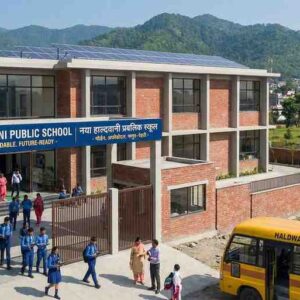New Delhi, India – 2025
The true purpose of education extends far beyond academic excellence or career preparation—it is about shaping individuals to lead meaningful, balanced, and well-rounded lives. In India, theNational Education Policy (NEP) 2020has brought this vision to the forefront, urging institutions to foster holistic development rather than focusing solely on grades and job readiness. Indian schools, colleges, and universities are now embracing this philosophy, laying the foundation for students to thrive in every aspect of life.
The Indian Approach to Holistic Education
1. Inspired by India’s Educational Roots:
Indian education has historically been rooted in a holistic framework, as seen in thegurukul system, where students learned not only academic subjects but also ethics, physical fitness, and life skills. Today, institutions likeRishi Valley School in Andhra PradeshandTagore’s Santiniketan in West Bengalare reviving this ethos by blending traditional values with modern education. These schools emphasize creativity, community living, and experiential learning, helping students grow intellectually and emotionally.
2. The Role of NEP in Modern Education:
The NEP 2020 builds on India’s rich educational heritage while incorporating global best practices. Its focus oninterdisciplinary learning, skill development, andethical educationensures students are not just employable but also capable of leading balanced and purposeful lives. Institutions likeJawahar Navodaya Vidyalayas (JNVs)have already begun implementing these principles, creating an environment where students excel academically while developing critical life skills.
The Core of Real Education
3. Emotional and Social Growth:
Real education equips students with the ability to navigate life’s challenges. Indian schools likeThe Doon School in Dehradunemphasize teamwork, resilience, and leadership through co-curricular activities such as debates, drama, and community service. These experiences help students build emotional intelligence, a crucial trait for personal and professional success.
4. Ethical and Civic Responsibility:
Institutions such asIIT Gandhinagarare integrating courses on ethics and societal impact, encouraging students to think beyond personal gain. By fostering a sense of responsibility toward their communities, these programs ensure students grow into socially conscious individuals who can contribute to India’s development.
Practical Skills for Real-Life Challenges
5. Financial Literacy and Entrepreneurial Thinking:
With NEP’s emphasis on practical learning, schools likeDelhi Public School (DPS)are introducing courses on financial literacy and entrepreneurship. These programs teach students how to manage money, make informed decisions, and even launch their own ventures, preparing them for both professional and personal success.
6. Sustainability and Environmental Awareness:
Institutions likeAshoka UniversityandTERI School of Advanced Studiesintegrate environmental education into their curriculums, teaching students about sustainability and conservation. This holistic perspective encourages students to lead environmentally conscious lives, aligning personal actions with global goals.
The Role of Indian Higher Education
7. Multidisciplinary Learning in Universities:
Leading universities likeBanaras Hindu University (BHU)andAmrita Vishwa Vidyapeethamare adopting NEP’s multidisciplinary model, offering students the freedom to combine fields such as technology and the arts. This flexibility fosters creativity and innovation, ensuring students are prepared for dynamic career paths and life challenges.
8. Research and Real-World Applications:
Institutes likeIIT Madrasare promoting project-based learning, where students work on real-world problems. From developing clean energy solutions to creating affordable healthcare technologies, these initiatives help students apply their knowledge in meaningful ways, contributing to society while building essential skills.
Wellness and Mindfulness in Education
9. Mental Health and Emotional Resilience:
With rising awareness about mental health, schools likeShiv Nadar Schoolare introducing wellness programs that include mindfulness exercises and counseling services. These initiatives help students manage stress and develop emotional resilience, equipping them to handle life’s pressures with confidence.
10. Physical Fitness and Extracurricular Engagement:
Institutions likeRamakrishna Mission Schoolsintegrate physical fitness with values-based education, emphasizing the importance of a healthy body and mind. Activities such as yoga, sports, and cultural programs ensure students grow holistically, developing discipline and focus.
A Future Ready for Life
11. Building Lifelong Learners:
Real education instills curiosity and a love for learning. Schools likeKendriya Vidyalayas (KVs), known for their inclusive education system, encourage students to explore new subjects and interests, fostering a growth mindset that stays with them throughout life.
12. Preparing for Uncertainty:
The NEP’s focus on adaptability and critical thinking ensures that students are ready to face an uncertain future. Whether navigating career changes, personal challenges, or societal shifts, students equipped with these skills can thrive in any circumstance.
Conclusion: Real Education, Real Impact
Education in India is undergoing a transformation, with schools and universities embracing the NEP’s vision of holistic, skill-based learning. By focusing on character, curiosity, and life skills, Indian institutions are preparing students not just for careers but for a well-rounded life.
As students learn to balance academics with emotional resilience, practical skills, and social responsibility, they emerge as individuals ready to contribute meaningfully to their families, communities, and the world. This shift in education is not just a reform—it’s a return to the very essence of learning, one that empowers students to lead purposeful and fulfilling lives.










